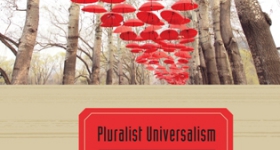Nostalgia, an idealized love and longing for the land that the immigrants leave behind, has been the concern of much diasporic writing. Diasporic fiction is marked by a constant movement and desire for a return that rarely actually happens. Myths are a natural result of diasporic experience. In displacement, humans draw succor from these myths about homeland.
When I picked up Houston based Indian American writer, Saborna Roychowdhury’s debut novel, The Distance, I had a feeling that it might turn out to be yet another story about immigrant nostalgia. To Roychowdhry’s credit, she refuses to grant nostalgia a special place. The protagonist Mini’s sense of disconnect in the west does not remain confined to a false sense of longing for the land she left behind. At the end of the novel, she literally returns to India.
The novel deals with distance first of all as a symbol. The people in Mini’s family are distant from each other while occupying the same apartment. It also engages with distance in its actual dimension, and this can be seen in Mini’s journey to Vancouver away from home in Calcutta. What drew me in is the way the novel explores distance in a double sense -- at once a desire to escape reality as well as the impossibility of escape.
The novel employs a recurrent structure as if to emphasize Mini’s repetitive life. Whereas the first part of the novel is set in Calcutta, India, the second part is set in Vancouver, Canada. Both follow similar rhythms of life: movement in a restricted space, routine life of repetitive action, and a failure to transcend the barrier of space, either of the room or of the city. The limited physical mobility serves to create a claustrophobic atmosphere that affects the reader almost viscerally.
Roychowdhury amply succeeds in laying bare the ordinariness of Mini’s life in Calcutta: a two-roomed tiny apartment in Gariahat; a grandmother fastidiously holding onto tradition; a mother grudgingly bearing the vestiges of that tradition; and a father outwardly content with his middle-class existence. In a language that is bare and precise, Mini recounts her life: “We lived in a crowded two-bedroom apartment overlooking the busy Gariahat corner where five road arteries intersected: my parents, grandmother, younger brother and me. Outside our old apartment building, long lines of vendors sold food, jewelry, underwear, and books on their pushcarts.” The vivid description of the apartment and the city demonstrates how the routine intimate spaces of the apartment and of the city can appear distant.

Author Saborna Roychowdhury
In the latter part of the novel, distance is literal as Mini leaves India for Vancouver, after her wedding to Neel, an engineering student. The actual physical distance allows Mini to anticipate a radical break from the lives of other women in her family: “My mother’s life had been similar to my grandmother’s and my grandmother’s to her mother. But I was now breaking away from this cast.” She does break away, but the relief is momentary. The newness of an occasional visit to a mall wears off soon. The harsh middle-class life in Calcutta makes way for eternal boredom in Vancouver. Life comes full circle in a tiny apartment in the immigrant part of the city. As someone who has lived in both the cities, Roychowdhury’s exploration of immigrant life speaks to my own experience. The setting and environment are convincing.
What makes Roychowdhury’s novel tick is her evocative use of space and distance. In the book, space is most often cloistered. Distance, in a physical sense, is equally unproductive. The novelist, however, wonderfully exploits the imaginative potential of distance. To me, the most appealing aspect of the novel is its assertion that one need not traverse distance in order to transform one’s mundane life. The novelist succeeds in emphasizing this through the character of Amitav, the college Marxist. He dreams of transforming the sedate Bengali society into a revolutionary one. Enchanted by his beliefs, Mini falls in love with him. Though shallow and non-committal, Amitav makes us think of transformative political possibilities that are distant and cannot be realized at the present.
In this otherwise sensitive book, the only jarring note is the reiteration of a stereotype about social inequities in Bihar, a neighboring state. Amitav travels to a Bihar village to take on the local landlord. Why would a revolutionary hoping to change Bengal travel to Bihar? The long communist regime in the state of Bengal had perfected the art of farsightedness that didn’t allow them to see the social ills that befell their own state. Perhaps, Roychowdhury wanted to underscore the myopia in Bengali communists/revolutionaries.
In spite of this minor oversight, Saborna Roychowdhury deftly weaves estrangements between people, spaces, generations, ideologies, and lives in this worthwhile read. The grim ordinariness of Mini’s life might appear painful, depressing, and frustrating to the reader. But the readers will be happy to see redemption at the end. In Mini, Roychowdhury has created a character of an ordinary woman with whose struggles we can identify. I hope the novelist will return to Mini in her next venture!
Mosarrap Hossain Khan is a doctoral student in the Department of English, New York University.









Comments